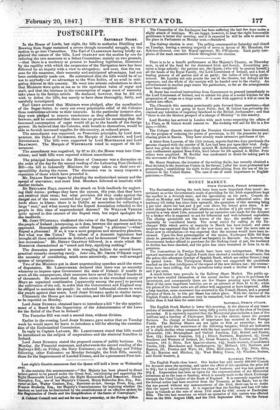There is to be a benefit performance at Her Majesty's
Theatre, on Thursday next, in aid of the fund for the distressed Irish and Scotch. Everything pro- mises a large subsidy: the patrons are, the Queen, (who will be present herself,) all the heads of the Royal Family, the Lord-Lieutenant of Ireland, and a host of leading persons of all parties and of no party; the ladies of title being predo- minant. Mr. Lumley not only grants the use of the theatre, but defrays all the expenses; and the whole of the receipts will be handed over to the charity. An advertisement in another page states the particulars, so far as the arrangements have been completed.
M. Soyer has received instructions from Government to proceed immediately to the Lord Lieutenant of Ireland, and to submit his plan of a model kitchen for the preparation of soups on a large scale. If it meet with approval it will at once be carried into effect.
The Chronicle this morning prominently puts forward three assertions,—that Lord Normanby is not going to leave Paris; that M. Guizot has privately dis- claimed any intention of imputing falsehood to the British Ambassador; and that "there is not the faintest prospect of a change of Ministry" in this country.
Lord Bowden has arrived in London with such terms respecting the affairs of La Plata, as M. Guizot would consent to. His lordship will sail for Rio in a few days.—Globe.
The Cologne Gazette states that the Prussian Government have determined, for the purpose of reducing the prices of provisions, to fill the granaries by pur- chasing grain in Russia. They have already made extensive purchases of rye.
A letter from Lucerne, of the 12th instant, reports that two days previously the persons charged with the murder of M. Len had been put upon their triaL Judg- ment was given on the 12th—death against M. Achermann, eighteen years' soli- tary confinement against Rosa Felix, hard labour for life against A. Muller. Four others were acquitted. M. Bechler was condemned to death for taking part in the movement of the Free Corps.
Mr. Henry Stephens, the inventor of the writing fluids, has recently obtained a final decision in the American Courts in his favour, [after the most protracted law proceedings,] establishing his right to the profits arising from the use of his in- ventions in the United States. The case is one of some importance to English patentees.—Times.


























 Previous page
Previous page